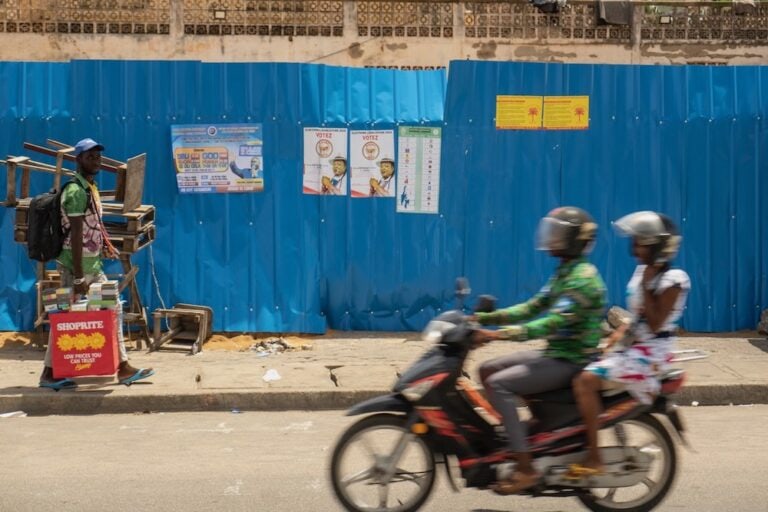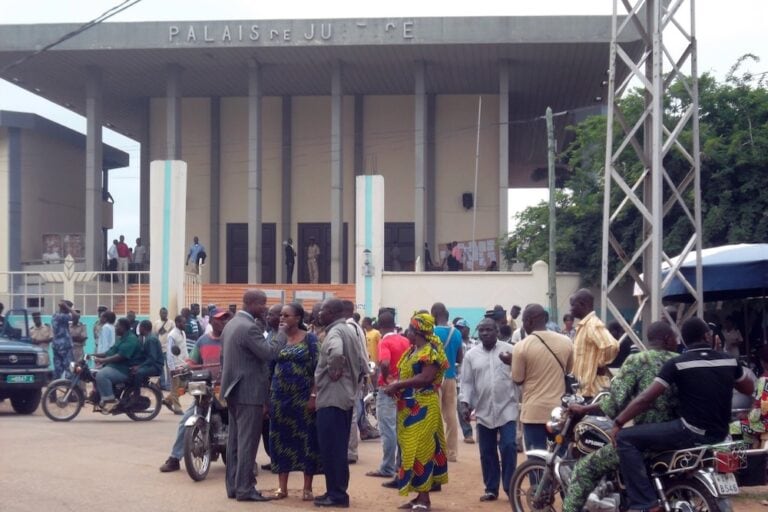"Tribune d'Afrique" decided to suspend publication in Togo for one week in protest against police harassment of its staff.
(RSF/IFEX) – 10 February 2012 – Reporters Without Borders and Avocats sans Frontières (Lawyers Without Borders) are concerned about the safety of the staff of the regional bimonthly Tribune d’Afrique and their ability to work freely after one of its journalists, Max Savi Carmel, was interrogated by the police for six hours yesterday in Lomé.
The two organizations supported Tribune d’Afrique when a Lomé court suspended the magazine’s distribution in Togo in August 2010 for alleged defamation and dissemination of false information.
“We condemn the way the police harassed Max Savi Carmel in an attempt to get him to drop a story he has been investigating and to reveal his sources, in violation of a fundamental principle of journalism,” the two organizations said. “We call for an end to this kind of traumatic incident that is clearly designed to intimidate Tribune d’Afrique’s journalists.”
Tribune d’Afrique has decided to suspend publication in Togo for a week in protest against the police harassment of its staff. It has also decided to file a complaint “against unknown persons” for “espionage” and “leaks” from within its office.
This is the account that Carmel gave today of yesterday’s events:
“After being contacted by a women who called from 00228 98 24 96 39 and said she could give me information for a story I have been researching since 12 December, I went at around midday yesterday, 9 February, to the administrative centre of Lomé, Togo, where I have been living for several years and where I work as a journalist.
The woman was supposed to be waiting for me outside the communication ministry office, but when I arrived two men jumped into my car, showed me a gendarmerie ID card and asked me to remain calm so as not to be roughed up. Within a few seconds, I found myself in another car, a Camry parked near the Criminal Investigation Department, in which I was taken seven minutes later, at 12:43 pm, to the premises of the Intelligence and Investigation Department (SRI). In an office there, I was subjected to six hours of interrogation that was sometimes heavy-handed, sometimes relaxed and often tedious.
I was obliged to provide information about a story that I have been investigating for many weeks. I was expressly asked to give the names and numbers of my sources and to help the gendarmerie to question them. I resisted doing this for hours before being released. They proposed that I should work with the SRI, which I refused outright to do. My interrogation was conducted by Capt. Akakpo, another officer whose name I do not known, and the Director General of the Togo Gendarmerie, Col. Yark.
For the entire afternoon I was deprived of the medicine I need for a chronic illness and, despite my insistence, I was not allowed to call my lawyer. I was also deprived of my mobile phone, which Capt. Akakpo examined at length. I was released at 6:45 pm and the gendarmerie offered to take me home. I politely declined the offer.
When Capt. Akakpo accompanied me to my car, which an officer had driven to the gendarmerie, I found that the bag containing my computer was open. I would like to point out that Capt. Akakpo had previously asked me to allow him to access my laptop, which I had refused. It is protected by a password. One of my Moov Internet USB flash drives and an ordinary, ash-coloured 4 GB USB flash drive had disappeared. Nothing else had disappeared, as far as I have been able to establish.
My car had been driven badly and was scratched because it had brushed against something. I asked them to repair the damage and the Director General gave me an appointment for the next day, today, in order to deal with it.
I am very worried about my safety, as I have been investigating several sensitive matters and my newspaper has referred an illegal binding decision by the High Authority for Broadcasting and Communication (HAAC) to Togo’s constitutional court. The Togolese government has for years claimed that Tribune d’Afrique is hostile to the Faure Gnassingbé government. At the end of a 12-minute trial, the newspaper was sentenced to permanent closure and a fine of 63 million (100,000 euros). After a major international campaign, the sentence was reduced.
I was not tortured physically nor subjected to any other kind of physical violence during the time I was detained. But I have been traumatised by the experience and extremely upset by it psychologically. I signed a police statement acknowledging the fact that I had been interrogated. The management of Tribune d’Afrique decided at once to provisionally suspend publication and to reduce to a minimum the activities of its Togolese headquarters, located at Adidoadin, Curie des Médias.”


